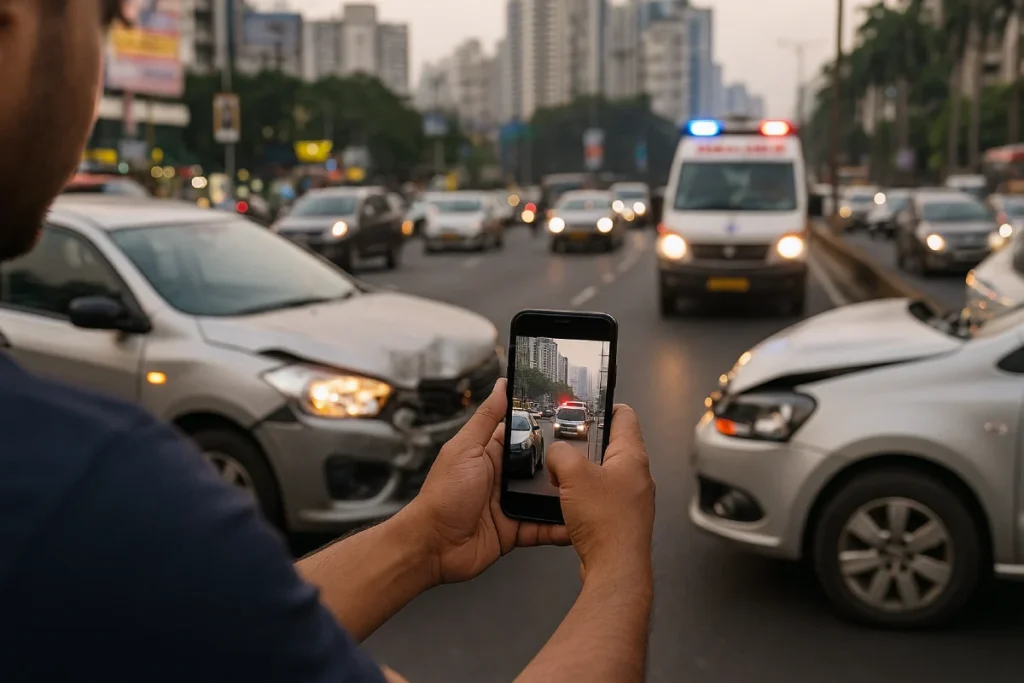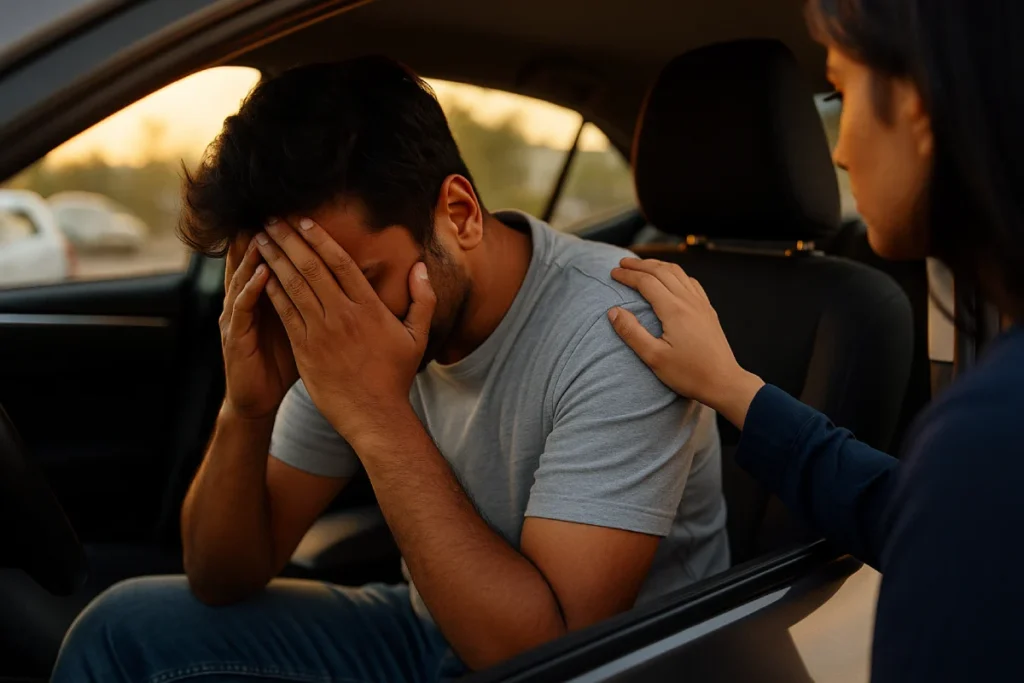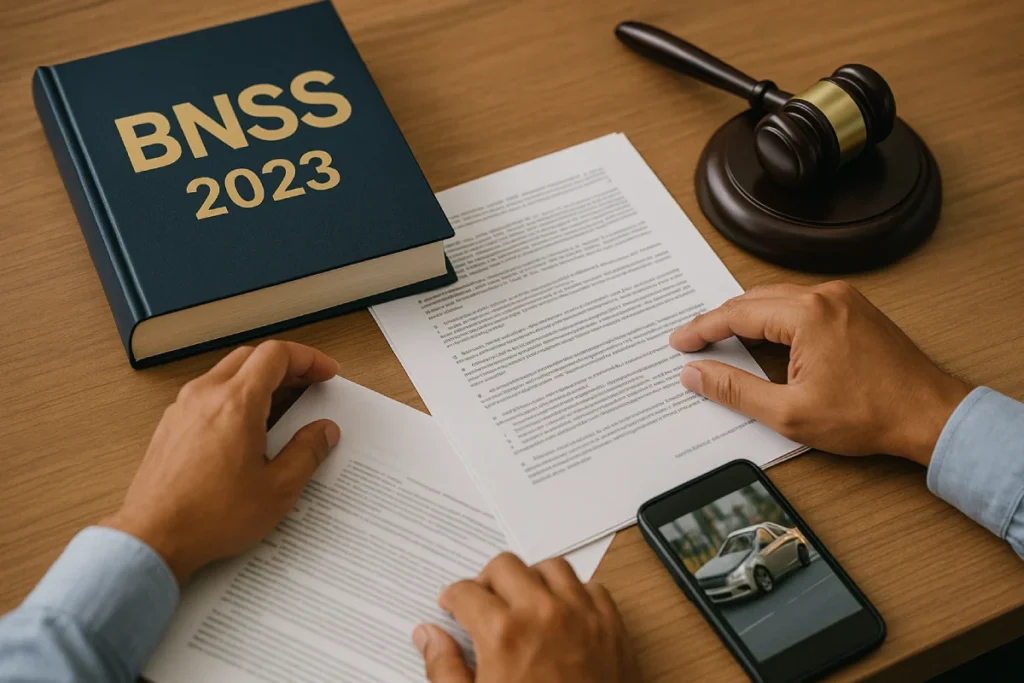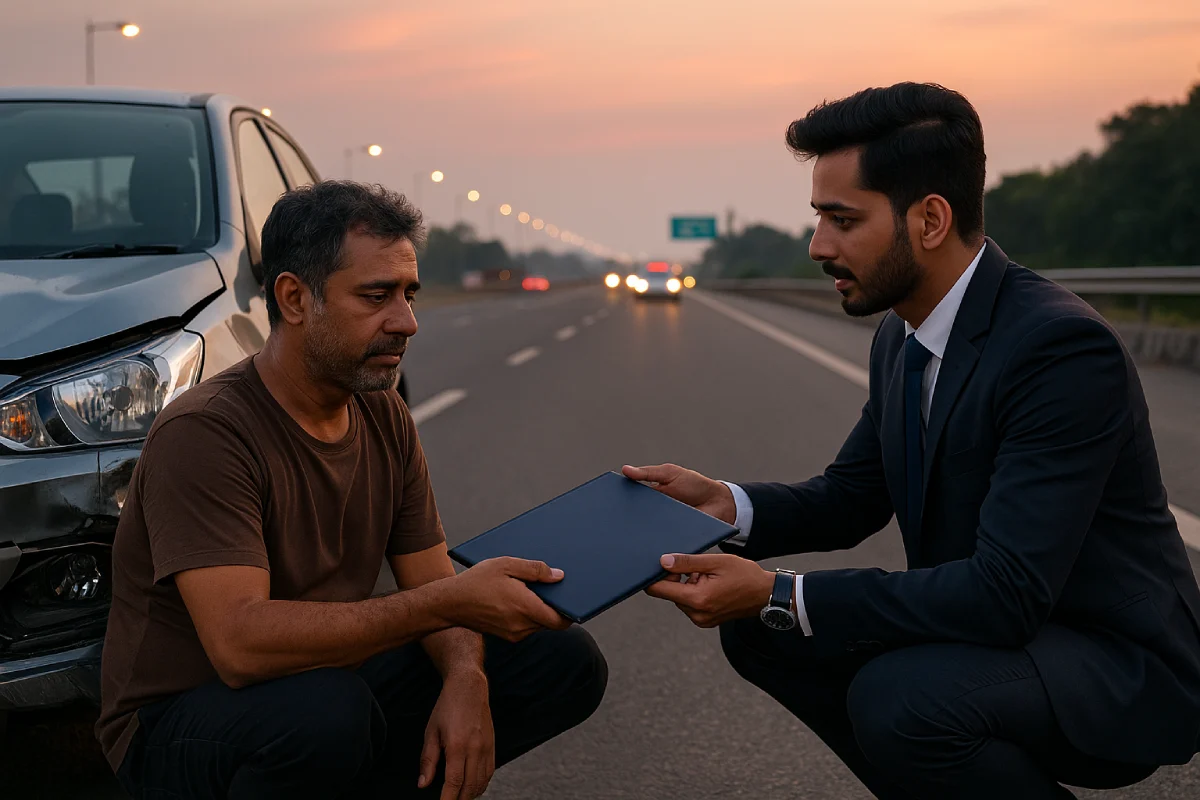Road Accident Legal Support: A Compassionate Guide in India
The screech of tires, the jarring impact – a road accident is a sudden, violent disruption to the rhythm of life. In a matter of seconds, it can leave behind a trail of physical injuries, emotional scars, and a bewildering maze of legal and financial challenges. In India, where bustling roads present daily uncertainties, being prepared for the aftermath of such an unfortunate incident is crucial. The emotional outpour is immense, and the legal hassles that follow can be just as overwhelming.
This blog by Kapil Dixit LLP aims to be your compassionate guide through this turbulent time. We will provide a clear, step-by-step roadmap for navigating the moments immediately following a road accident, managing the inevitable emotional trauma, and understanding your rights and duties under India’s evolving legal framework, including the new Bharatiya Nagarik Suraksha Sanhita (BNSS), 2023. Our goal is to empower you with knowledge so you can protect yourself and your loved ones, ensuring that the path to recovery and justice is as smooth as possible.
The First 60 Minutes: Your Immediate Actions After a Road Accident and Legal Claim
The moments following an accident are critical. Shock and panic are natural, but a clear head can make a significant difference in ensuring safety and protecting your legal rights. Here is a checklist of immediate actions to take:

- Prioritize Safety and Medical Help: Before anything else, assess yourself and your passengers for injuries. If anyone is hurt, call for an ambulance immediately (dial 108 or 102). If you are seriously injured, try not to move and wait for emergency personnel to arrive. Your health is the absolute first priority.
- Secure the Scene: If the accident is minor and the vehicles are drivable, move them to the side of the road to avoid obstructing traffic and preventing further incidents. Turn on your vehicle’s hazard lights to warn other drivers.
- Contact the Authorities: It is crucial to call the police (dial 100 or 112) and report the accident, regardless of its severity. A police report, or First Information Report (FIR), is a vital legal document that forms the basis for your insurance claim and any subsequent legal action. In some states, it is a legal requirement to report any accident involving injury or significant property damage.
- Document Everything Meticulously: In the age of smartphones, evidence is at your fingertips. Take multiple pictures and videos of the accident scene from various angles. Capture the damage to all vehicles involved, their license plates, any visible injuries, and relevant road conditions or signs. This documentation can be invaluable as electronic evidence in legal proceedings under the new BNSS laws.
- Exchange Information Calmly: Exchange essential details with the other driver(s) involved. This includes full names, contact numbers, addresses, driver’s license numbers, and car insurance policy details. It is vital to remain calm and avoid admitting fault or apologizing, as this can be used against you later. Stick to the facts of what happened.
- Identify and Engage Witnesses: If there are any bystanders who witnessed the accident, politely ask for their names and contact information. Their statements can provide an objective account of the incident and significantly strengthen your case.
The Unseen Injury: Managing the Emotional and Psychological Outpour
The impact of a road accident extends far beyond twisted metal and physical wounds. The psychological toll can be profound and long-lasting, often becoming an “unseen injury” that requires dedicated attention and care.

It is entirely normal to experience a wide spectrum of powerful emotions in the aftermath. Shock and disbelief are often the first to set in, followed by fear, anxiety about driving again, anger at the situation, and even guilt, regardless of who was at fault. These feelings can manifest physically as disturbed sleep, muscle tension, and difficulty concentrating.
For many, these initial reactions can evolve into more serious conditions like anxiety disorders, depression, or Post-Traumatic Stress Disorder (PTSD). PTSD is particularly common among accident survivors and can involve distressing flashbacks, nightmares, severe anxiety, and actively avoiding any reminders of the traumatic event. Studies in India have highlighted that road traffic accidents can lead to significant mental health issues, impacting a victim’s quality of life and creating financial hardships for their families.
Acknowledging these emotional struggles is the first step toward healing. It is not a sign of weakness to seek help. Consider these coping strategies:
- Seek Professional Support: Talking to a therapist or counselor who specializes in trauma can provide you with the tools to process your experience and develop healthy coping mechanisms.
- Lean on Your Support System: Share your feelings with trusted friends and family. Emotional support from loved ones is invaluable during this challenging time.
- Acknowledge Your Feelings: Do not suppress your emotions. Recognizing them as a valid response to trauma is a crucial part of the healing process.
Crucially, from a legal perspective, compensation for “pain and suffering” is a recognized component of accident claims. Documenting your emotional and psychological distress can be essential for ensuring you receive a just settlement that accounts for the full scope of your damages.
The Legal Maze: Navigating Your Rights and Duties Under Indian Law
Once the immediate crisis has passed, you will face a series of legal procedures. Understanding your rights within the Indian legal system, especially with recent changes, is paramount.

The First Information Report (FIR)
The FIR is the cornerstone of the legal process following an accident. It is the official report filed with the police and is mandatory for making an insurance claim for theft, third-party liability, or significant damage. Even if the accident occurs in a different jurisdiction from your residence, you can file a “Zero FIR” at any police station, which will then be transferred to the appropriate one.
Understanding the New Legal Framework: The BNS and the BNSS
The Indian government has recently introduced new laws, replacing the Indian Penal Code (IPC) with the **Bharatiya Nyaya Sanhita (BNS), 2023**, and the Code of Criminal Procedure (CrPC) with the **Bharatiya Nagarik Suraksha Sanhita (BNSS), 2023**. These new laws have significant implications for road accident cases.
A key change is found in Section 106 of the BNS, which introduces stricter penalties for hit-and-run incidents to enforce accountability.
- Section 106(1) states that if a driver causes death by rash and negligent driving and reports the incident to the police or a magistrate, they may face imprisonment of up to five years.
- Section 106(2) imposes a much harsher punishment on drivers who flee the scene without reporting the incident. They can face imprisonment of up to ten years and a fine. This provision strongly incentivizes drivers to stop and assist victims.
Furthermore, the BNSS now formally accommodates modern evidence-gathering methods. All trials and inquiries may be held in electronic mode, and the digital evidence you collect on your phone photos, videos, and communications can be formally produced during the investigation and trial.
It’s best to have a dash camera operational covering the incidents in the front and rear of your vehicle. These electronic data can come in handy when the situation turns escalating for no mistake of your driver or person driving the vehicle.
The Motor Accidents Claims Tribunal (MACT)
The MACT is a specialized tribunal established to handle claims for compensation related to motor accidents. A claim can be filed by the person who has sustained injuries, the owner of the damaged property, or the legal representatives of the deceased. The application should be filed in the MACT that has jurisdiction over the area where the accident occurred or where the claimant resides.
Claiming Just Compensation
Victims of road accidents are entitled to compensation under the Motor Vehicles Act, 1988. This compensation is not just for medical bills but covers a range of losses:
- Medical Expenses: Costs of treatment, hospitalization, and future medical care.
- Loss of Income: Both current and future loss of earnings due to disability.
- Pain and Suffering: Compensation for the physical pain and emotional trauma endured.
- Loss of Consortium: Awarded to family members for the loss of companionship and support.
The Act also includes a “no-fault liability” provision, where a fixed compensation amount is payable in case of death or permanent disability without the need to prove the other party’s negligence. The government has also set compensation amounts for victims of hit-and-run accidents.
Why You Need an Accident Lawyer?
The aftermath of an accident is a whirlwind of medical appointments, insurance paperwork, and legal deadlines. Attempting to navigate this complex landscape while recovering from physical and emotional trauma can be a recipe for disaster. This is where an experienced accident lawyer becomes your most vital ally. Again, you may not need a lawyer for simple cases. A lawyer however can bring value in complex cases such as major accidents, hit and run cases, emotional outburst and unlawful situations.
A skilled lawyer from a reputable firm like Kapil Dixit LLP will:
- Protect Your Rights: Guide you through the intricate legal procedures, ensuring all paperwork is filed correctly and on time.
- Handle Negotiations: Liaise directly with insurance companies, who often aim to minimize payouts. A lawyer can negotiate effectively to secure a fair settlement that covers all your damages.
- Build a Strong Case: Assist in gathering crucial evidence, analyzing police reports, and, if necessary, collaborating with experts to establish fault.
- Provide Representation: Represent your best interests in the MACT, fighting to maximize your compensation for medical costs, lost wages, and the pain and suffering you have endured.
A road accident is a deeply distressing event, but with the right knowledge and support, you can navigate the path to recovery and justice. Remember to prioritize safety, document everything, and be mindful of your emotional well-being. The legal journey, especially with the new BNSS laws, requires careful and knowledgeable handling.
In the overwhelming aftermath of a road accident, you don’t have to navigate the path to justice alone. Contact Kapil Dixit LLP for expert legal guidance and compassionate support. We are here to help you rebuild.


